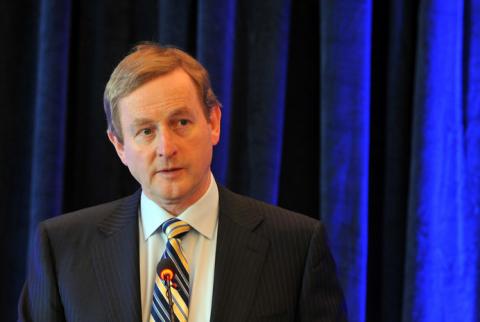War on Ireland's poor is gaining in intensity

Statements by lavishly-paid functionaries of international organisations, urging the lowering of the pay of people who are paid a fraction of their salary, are astounding to behold. By Vincent Browne.
Enda Kenny concluded the political season with yet another verbal howler, trying to be smart in answer to a question from Ursula Halligan about Eamon Gilmore having words with James Reilly.
Kenny doesn't have the requisite dexterity to carry off a play on language, as many of us don't. But what is telling is that Kenny fails to appreciate that he doesn't have that linguistic or mental dexterity and he gets into unnecessary tangles. Which revives anxieties about his fitness for the office of Taoiseach among those who think politics is about style and presentation.
His government has done well in a few areas. However it came about, there is at least a prospect that we might get some amelioration in the bank debt, arising from the last EU summit. It is obvious that this prospect fell into the lap of the Government by the insistence of the Italians and Spaniards that bank bailouts be financed directly by the ESM, rather than via sovereign government. But the reality is that there was sufficient goodwill at the summit to enable an acknowledgement that Ireland deserved some easing on that front. This may transpire to be more illusory than substantive, but the very fact there was such an acknowledgement is progress - and Kenny, along with Michael Noonan, deserves credit.
Kenny's government has brought political stability here, which is deemed, in financial circles, to be a plus. And in a few areas at least, in my opinion, they are headed in the right direction.
For instance, Alan Shatter's announcement of constitutional amendments to permit a restructuring of the courts system and of technical - but important - changes to Article 26 of the constitution, is welcome. There is a logjam at present at the level of the Supreme Court, with a backlog of three to four years on appeals from the lower courts. The establishment of a new Court (or Courts?) of Appeal for civil cases would be an important innovation, as would the establishment of a separate family courts system.
James Reilly's promise of a universal health insurance scheme is also very welcome, but whether he has the organisational and political skills to make that happen is doubtful. He seems to suffer from a conceit that also afflicted his predecessor: that he has the organisational talents to sort out the health system, although nothing in his career to date suggests such talents. There is no automatic assurance that, however successful a GP may be in making a load of money from medicine and otherwise, he or she has the capacity to organise anything other than a medical practice.
As has been with all governments, there is fractiousness between factions and personalities. These will probably play out in some minor crisis or other, with Reilly being the most likely star player in such dramas, Phil Hogan playing a bit-part role and Róisin Shortall the leading lady.
Kenny himself didn't help by failing to inform Eamon Gilmore of Cathal Magee's resignation as head of the HSE. It is quite extraordinary that there should have been a full discussion at the cabinet meeting on Tuesday about the HSE with Kenny and James Reilly not mentioning that - by the way - the chief executive of the HSE had resigned.
There could be a row over legislation on abortion, with a faction in Fine Gael siding with Labour in wanting to legislate to define parameters to the circumstances in which abortion may be performed here. (The Supreme Court ruled in 1992 that there was a constitutional right to abortion in certain very restricted circumstances.) And there are other areas susceptible to histrionics, such as the coming budget, but nothing serious, for there are no strong convictions on any side.
And that's a pity. For there is reason to believe there are moves afoot to immiserate even more the already miserable, via the agenda suggested by the IMF earlier this month. I don't think they will have the nerve to cut social welfare assistance for the unemployed, but they might well curtail entitlement to the full payment after a few months.
The IMF and the EU are very keen to "incentivise" unemployed people back to work, however badly-paid such work might be, however awful the conditions and however unsuitable the work itself.
Statements by Craig Beaumont and other lavishly-paid functionaries of international organisations, urging the lowering of the pay of people who are paid a fraction of their salary, are astounding to behold. It's a pity that nobody at the press conference on 18 July challenged Beaumont's effrontery.
Means-testing child benefit is another ruse of the elite, who disarmingly (they think) protest that people like themselves don't need such benefits. But we know that means-testing will open the way towards denying child benefit to many who badly need it. In any case, universal benefit removes the stigma associated with most social welfare payments.
As for "broadening the tax base", this is yet another scheme to take money from the poor, or at least the poorer. Yes, a property tax is a good idea, but "broadening the tax base" won't stop there. Sooner or later, it will involve lowering the threshold for the imposition of tax. For that's the "new politics" which we voted for 17 months ago. {jathumbnailoff}
Image top: EPP Group in the European Parliament (Official).
